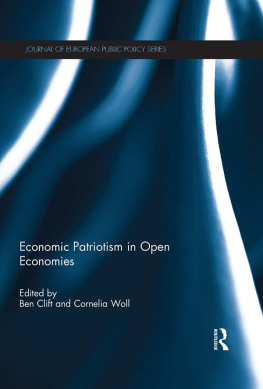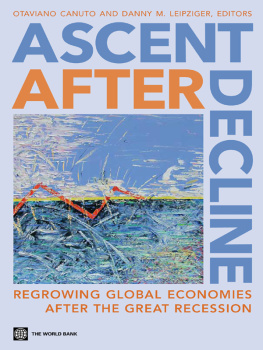Economic Patriotism in Open Economies
The recent financial crisis has demonstrated more than ever that governments seek to steer their economies rather than surrendering to the free play of market forces. Despite the ambitions of international economic cooperation, such interventionism is decidedly local. Some politicians even proudly evoke economic patriotism to justify their choices.
This volume links this phenomenon to a specific set of tensions between economic and political boundaries the paradox of neo-liberal democracy and argues that political interventionism in open markets is ubiquitous. The mandate of politicians is to defend the economic interests of their constituents under conditions where large parts of economic governance are no longer exclusively within their control. Economic patriotism is one possible reaction to this tension. As old-style industrial policy and interventionism gained a bad reputation, governments had to become creative to assure traditional economic policy objectives with new means.
However, economic patriotism is more than just a fashionable word or a fig leaf for protectionism. This volume employs the term to signal two distinctions: the diversity of policy content and the multiplicity of territorial units it can refer to. Comparing economic interventionism across countries and sectors, it becomes clear that economic liberalism will always be accompanied by counter-movements that appeal to territorial images.
This book was published as a special issue of the Journal of European Public Policy.
Ben Clift is Associate Professor of Political Economy in the Department of Politics and International Studies at the University of Warwick.
Cornelia Woll is Associate Research Professor at Sciences Po and co-directs the Max Planck Sciences Po Center in Paris.
Journal of European Public Policy Series
Series Editor: Jeremy Richardson is a Professor at Nuffield College, Oxford University
This series seeks to bring together some of the finest edited works on European Public Policy. Reprinting from Special Issues of the Journal of European Public Policy, the focus is on using a wide range of social sciences approaches, both qualitative and quantitative, to gain a comprehensive and definitive understanding of Public Policy in Europe.
Towards a Federal Europe
Edited by Alexander H. Trechsel
The Disparity of European
Integration
Edited by Tanja A. Brzel
Cross-National Policy Convergence:
Causes Concepts and Empirical Findings
Edited by Christoph Knill
Civilian or Military Power?
European Foreign Policy in
Perspective
Edited by Helene Sjursen
The European Union and New Trade
Politics
Edited by John Peterson and
Alasdair R. Young
Comparative Studies of Policy Agendas
Edited by Frank R. Baumgartner,
Christoffer Green-Pedersen
and Bryan D. Jones
The Constitutionalization of the European
Union
Edited by Berthold Rittberger and
Frank Schimmelfenig
Empirical and Theoretical Studies in EU
Lobbying
Edited by David Coen
Mutual Recognition as a New Mode of
Governance
Edited by Susanne K. Schmidt
France and the European Union
Edited by Emiliano Grossman
Immigration and Integration Policy in
Europe
Edited by Tim Bale
Reforming the European
Commission
Edited by Michael W. Bauer
International Influence Beyond
Conditionality
Postcommunist Europe after EU
enlargement
Edited by Rachel A. Epstein and
Ulrich Sedelmeier
The Role of Political Parties in the
European Union
Edited by Bjrn Lindberg,
Anne Rasmussen and
Andreas Warntjen
EU External Governance
Projecting EU Rules beyond
Membership
Edited by Sandra Lavenex and
Frank Schimmelfennig
EMU and Political Science
What Have We Learned?
Edited by Henrik Enderlein and
Amy Verdun
Learning and Governance in the EU
Policy Making Process
Edited by Anthony R. Zito
Political Representation and EU
Governance
Edited by Peter Mair and
Jacques Thomassen
Europe and the Management of
Globalization
Edited by Wade Jacoby and
Sophie Meunier
Negotiation Theory and the EU
The State of the Art
Edited by Andreas Dr,
Gemma Mateo and
Daniel C. Thomas
The Political Economy of Europe's
Incomplete Single Market
Edited by David Howarth and
Tal Sadeh
The European Union's Foreign Economic
Policies
A Principal-Agent Perspective
Edited by Andreas Dr and
Michael Elsig
The Politics of the Lisbon Agenda
Governance Architectures and Domestic
Usages of Europe
Edited by Susana Borrs and
Claudio M. Radaelli
Agency Governance in the European
Union
Edited by Berthold Rittberger and
Arndt Wonka
The EU Timescape
Edited by Klaus H. Goetz and
Jan-Hinrik Meyer-Sahling
The EU's Common Foreign and Security
Policy
Edited by Helene Sjursen
Economic Patriotism in Open Economies
Edited by Ben Clift and
Cornelia Woll
The Power of the European Court of
Justice
Edited by Susanne K. Schmidt and
R. Daniel Kelemen
First published 2013
by Routledge
2 Park Square, Milton Park, Abingdon, Oxon, OX14 4RN
Simultaneously published in the USA and Canada
by Routledge
711 Third Avenue, New York, NY 10017
Routledge is an imprint of the Taylor & Francis Group, an informa business
2013 Taylor & Francis
This book is a reproduction of Journal of European Public Policy, vol. 19, issue 3. The Publisher requests to those authors who may be citing this book to state, also, the bibliographical details of the special issue on which the book was based.
All rights reserved. No part of this book may be reprinted or reproduced or utilised in any form or by any electronic, mechanical, or other means, now known or hereafter invented, including photocopying and recording, or in any information storage or retrieval system, without permission in writing from the publishers.
Trademark notice: Product or corporate names may be trademarks or registered trademarks, and are used only for identification and explanation without intent to infringe.
British Library Cataloguing in Publication Data
A catalogue record for this book is available from the British Library
ISBN13: 978-0-415-62474-9
Typeset in Times New Roman
by Taylor & Francis Books
Publisher's Note
The publisher would like to make readers aware that the chapters in this book may be referred to as articles as they are identical to the articles published in the special issue. The publisher accepts responsibility for any inconsistencies that may have arisen in the course of preparing this volume for print.











